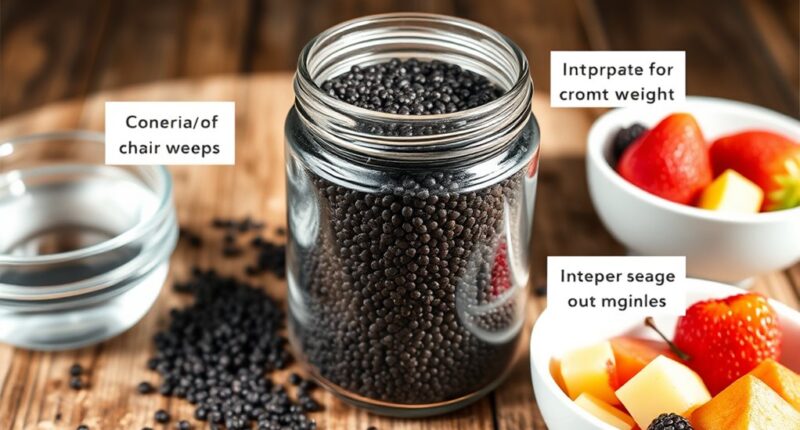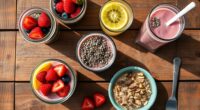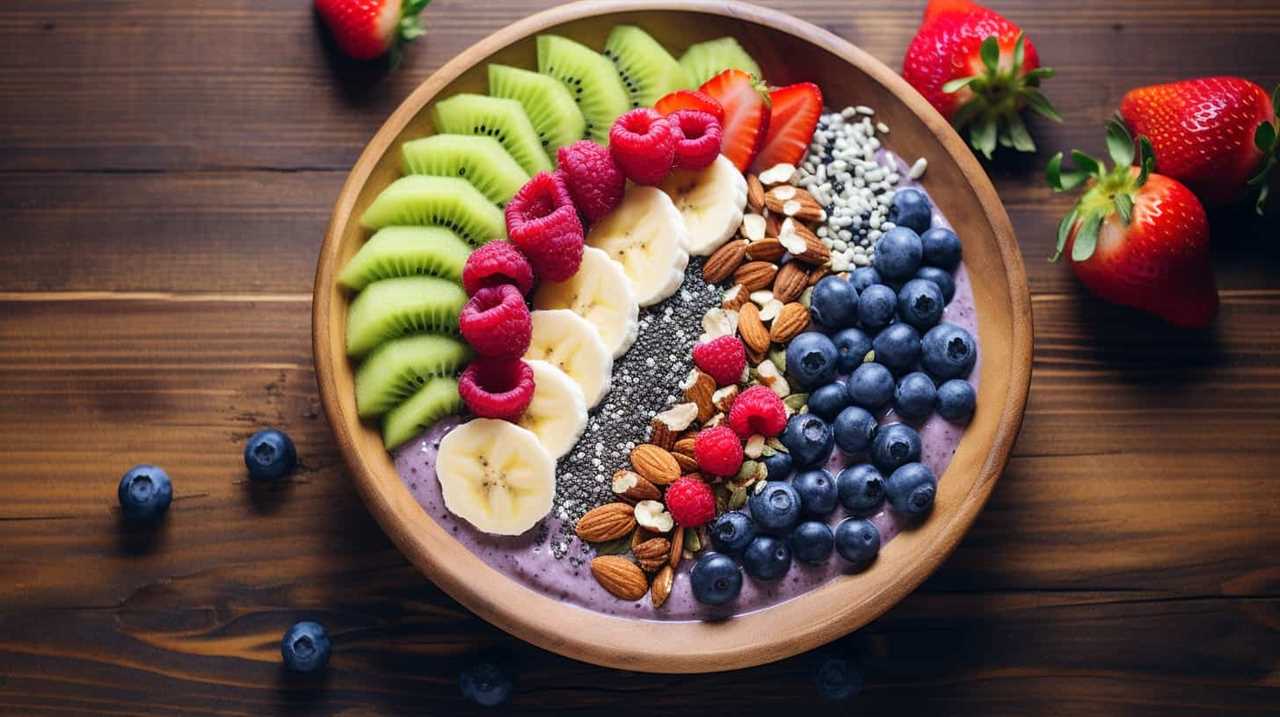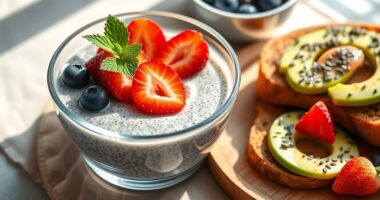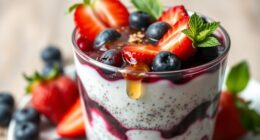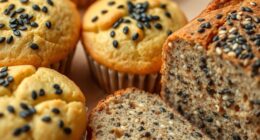One common mistake is overeating chia seeds—stick to 1-2 tablespoons daily to avoid excess calories. Timing matters too; adding them to meals or pre/post workouts can maximize benefits, but avoid eating late at night. Don’t forget hydration—since chia absorbs water, drinking plenty of fluids is essential. Remember, chia isn’t a magic fix; combining it with a healthy lifestyle is key. Keep these tips in mind, and you’ll find out how to use chia effectively.
Key Takeaways
- Eating too much chia seeds without portion control can lead to excess calorie intake.
- Consuming chia at inappropriate times, like late at night, reduces its weight loss benefits.
- Relying solely on chia seeds without combining them with a balanced diet and exercise limits effectiveness.
- Not hydrating properly after consuming chia seeds can cause digestive issues or choking.
- Using unprepared or dry chia seeds increases the risk of choking and reduces their health benefits.
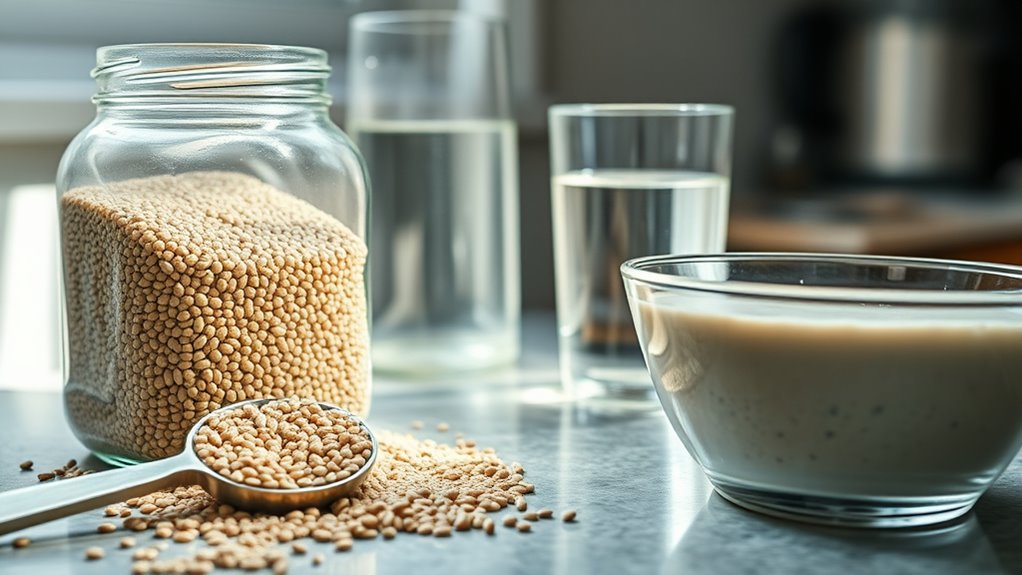
While chia seeds are often praised for their weight loss benefits, many people make common mistakes that hinder their effectiveness. One of the most frequent errors is not paying attention to portion control. Although chia seeds are nutrient-dense and can help you feel full longer, eating them in large quantities won’t necessarily speed up your weight loss. Instead, it can lead to consuming too many calories, which works against your goals. To get the most out of chia seeds, stick to recommended serving sizes—usually about one to two tablespoons per day. Using a measuring spoon can help you stay consistent, ensuring you don’t accidentally overeat. Remember, even healthy foods can contribute to weight gain if portions are too large.
Pay attention to portion sizes of chia seeds to avoid overeating and support your weight loss goals.
Timing strategies are equally important but often overlooked. Many people don’t consider when they consume chia seeds, missing opportunities to maximize their benefits. For example, adding chia to a balanced breakfast can help curb hunger throughout the morning, preventing unnecessary snacking. Alternatively, consuming chia seeds before or after workouts can provide sustained energy and aid in recovery. The key is to incorporate chia at strategic times that support your overall eating pattern, rather than randomly tossing them into meals. If you eat chia seeds too late at night, you might not get the full benefit, as your body’s metabolic rate slows down during sleep, making it less effective for weight management. Additionally, understanding how metabolism influences weight loss can help you optimize the timing of your chia seed consumption for better results.
Another mistake is thinking that simply adding chia seeds to your diet will automatically lead to weight loss. While they are helpful, they aren’t magic bullets. You need to combine chia seeds with a balanced diet and regular exercise to see real results. Relying solely on their presence in your meals without adjusting other habits won’t do much. Also, some people forget that chia seeds absorb liquid and expand, which can lead to choking hazards if not prepared properly. Always soak or hydrate your chia seeds before eating to prevent discomfort or choking.
Finally, many overlook the importance of hydration. Since chia seeds absorb a lot of water, drinking plenty of fluids when consuming them helps prevent digestive issues and maximizes their benefits. When you keep portion sizes in check, use smart timing strategies, and incorporate chia seeds thoughtfully into your routine, you’re more likely to see positive results on your weight loss journey. Avoiding these common mistakes will help you harness chia seeds’ full potential while maintaining a sustainable, healthy approach.
Frequently Asked Questions
Can Chia Seeds Cause Weight Gain if Overconsumed?
Yes, you can gain weight from overconsuming chia seeds. Eating too many can lead to calorie overload, making it harder to lose weight. Plus, excessive intake may cause a nutrient imbalance, as your body gets too much fiber and other nutrients without enough variety. To avoid this, stick to recommended portions and balance chia seeds with other healthy foods, ensuring you get a diverse mix of nutrients without overdoing it.
Are There Any Medical Conditions That Contraindicate Chia Seed Intake?
You should be aware that certain medical restrictions and dietary considerations might limit your chia seed intake. If you have conditions like swallowing difficulties, gastrointestinal issues, or allergies, consuming chia seeds could cause complications. Always consult your healthcare provider if you’re pregnant, breastfeeding, or on medications, as chia seeds can interact with some treatments. Being mindful of your health needs helps you enjoy chia seeds safely without risking adverse effects.
How Do Chia Seeds Compare to Other Weight Loss Superfoods?
When comparing chia seeds to other weight loss superfoods, you’ll notice their high nutrient density and antioxidant content stand out. Chia seeds are rich in fiber, omega-3s, and minerals, helping you feel fuller longer. While berries or green tea also boost health, chia seeds provide a unique combination of nutrients that support weight management. Incorporating them into your diet offers a versatile, nutrient-packed option to enhance your weight loss journey.
Should I Take Chia Seeds Before or After Meals for Best Results?
You should take chia seeds about 15-20 minutes before meals to optimize digestion effects and enhance satiety. This timing helps your body better absorb nutrients and may reduce overeating. If you prefer, adding them after meals can still support digestion, but pre-meal intake is generally more effective for weight loss. Experiment to see what works best for your digestion and appetite control.
Can Chia Seeds Interfere With Weight Loss Medications?
Imagine chia seeds as tiny ships steering your body—sometimes they might cause unexpected detours. Chia seed interactions with weight loss medications are rare but possible; they can affect how your meds absorb or work. If you’re on medication, always check with your doctor before adding chia seeds to your routine. This way, you prevent any unintended effects and keep your weight loss journey smooth and safe.
Conclusion
Avoiding these common mistakes can make a big difference in your weight loss journey. For example, Sarah thought she was doing everything right by adding chia seeds to her smoothies, but she wasn’t drinking enough water. Once she increased her intake, she saw better results. Remember, consistency and proper usage are key. Stick to these tips, and you’ll be more likely to reach your goals with chia seeds supporting your efforts every step of the way.
